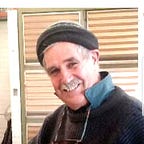‘Green Dream’ ideals run deep in Australia
Which is why baby boomers and millennials have much in common
Reminiscences of a deep green conservative
By P.K. Denton
I remember sitting in an old wooden hall on a beautiful sunny day in Nimbin in northern NSW during Australia’s great Aquarian music festival.
It was 1973, my last year of high school (May holidays from memory) and the passionate discussion was about how we were going to change the world.
I was transfixed. Looking out over the emerald green hills of struggling dairy farming country that had become a seething, transient village of thousands of idealistic souls, the “happening raves” were uncannily similar to those currently tearing through western politics — renewable energy, biodiversity, sustainable farming and architecture and new ways of living.
Somewhere in the background was a gloriously raucous guitar soundtrack of a generation determined to throw off the shackles of post-war austerity and rectitude. This was Australia’s Woodstock moment.
It was heady stuff for an eighteen-year-old with liberal parents undergoing their own political catharsis (my father, a university farm administrator, was in the process of discovering wine, women and hallucinogens in quick and disastrous succession after an early life of strict Methodism).
For me, Nimbin set a political path I have followed erratically ever since.
Alternative politics seemed more human (and in hindsight, comfortably middle class) than socialism or communism, and offered a way forward that embraced both commerce and human rights, but without the paranoia that I perceived to be the preserve of the few hard-line conservatives I knew.
But over the years the green dream slowly fell apart. Like Nimbin itself, it fragmented into a commercial cliche and numerous, seemingly disconnected, silos of activists.
Yet in nearly every suburb and town there evolved an environment center of some kind, perhaps centered around a bookshop or occupying a room in a dilapidated building somewhere. Some grew into large organizations that have become household names. Most, however, stayed determinedly local.
The green movement is far more deeply entrenched than many politicians realize. It has been around a long time
Communes and multiple occupancies came and went, and even my parents, in their early retirement, briefly joined a commune of bohemian artists, Christian socialists and even a famous communist or two. They all got along famously for about five minutes before descending into internecine warfare that would have made Ho Chi Minh blush.
As for me, like so many of my generation, after backpacking and university, I cut my hair, got a job, got married, started a business, raised a family (actually, it was infinitely more complicated than that, but anyway… ). Morna, the kids and I ended up on our small and lovely farm that probably cost us as much as we ever made out of it, but it was a happy home for many years.
But despite vague warnings of a dystopian future, there was no urgent or overarching narrative as there is today. Often those saving whales or organizing farmers markets or living the green dream had only vague connections with each other.
During a relatively short stint as a Greens Senate candidate in the mid 1990’s I was rather bewildered by some local environmental groups who resented aspiring politicians like myself who sought to make these connections — who sought to politicize green politics.
(Perhaps that is why my stint was short — but that’s another story. Suffice to say, I was not cut out for politics. Ultimately I preferred the solitary life of a writer; I was, I suppose, more policy wonk than political bonker).
What I did come to realize, however, was that without a healthy environment we were finished as a species. Along with millions of others, this became my quiet but firmly placed lodestar, a political reference point that shaped my thinking on virtually every issue. It just made sense.
So where do school age, placard-waving Millennials and post-Millennials come into this story?
The images here, created by my nephew Louis Denton, pretty much tell the story.
After decades of ravaging greed-is-good globalism, a generation has come along who has connected the dots. They get it. It’s not just about saving whales, it’s about everything, about how we live on the planet.
The strong green movement emerging among Millennials seems far more practical and urgently self-interested than it was for my generation of baby boomers.
As they are making abundantly clear, they feel ripped off by previous generations who have raped their environmental heritage and pushed the world to the brink of climate destruction.
They have a lot of support. All those parents and grandparents who were part of those little environment groups across the nation have their back.
And while I notice that Rupert Murdoch and his paranoid nodding heads at Fox News are getting hysterical about green conspiracies subverting innocent school kids, the reality is that the green movement is far more deeply entrenched than many politicians realize. It has been around a long time.
So that is why every time kids in Australia go onto the streets to demonstrate against climate disruption, or the kids in America take to the streets about gun control, I’m right with them, thinking of Nimbin and where, for me, it all began.
